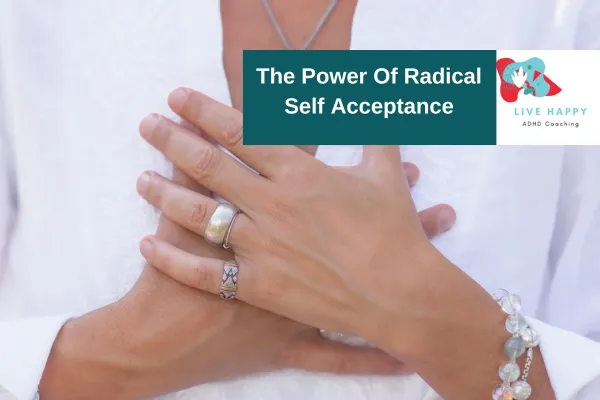
The Power Of Radical Self Acceptance
The Power Of Radical Self Acceptance
If I Can Do It, You Can Too!
No BS, no $5k investment, and no unrealistic promises—just simple, accessible steps that can transform your relationship with your ADHD brain. This is my passion, and I'm thrilled to share this journey with you.
The Foundation: Understanding Neurodivergent Trauma
Trauma and neurodivergence are inextricably linked and highly co-morbid. Many of us with ADHD have never felt fully accepted or safe because we operate differently. Our natural coping mechanisms and stims were often discouraged or punished. Many of our parents were likely neurodivergent themselves without knowing it—overwhelmed and reactive—creating environments where we never experienced the foundation of safety that neurotypical people often take for granted.
A critical insight: A significant cause of childhood trauma is unregulated neurodivergent parents recreating the only environment their nervous systems recognize as familiar—chaos.
The Self-Acceptance Journey for ADHD Brains
Step 1: Rewire Your Thought Patterns
How can you love yourself unconditionally when you've known at a cellular level you were "different" from day one? How do you regulate your nervous system when you've never experienced what being regulated feels like?
Start by becoming aware of your negative self-talk patterns. For many ADHD adults, thoughts are constantly colored by guilt and shame. You CAN change this by redirecting your thoughts toward acceptance of yourself—all your messiness included.
Remember: Unfelt or repressed emotions (especially those we don't feel safe expressing, like anger) are stored in the body through the nervous system. This physical manifestation can cause real illness and pain. Ever had a stress-induced stomach ache or migraine? This is why.
Step 2: Allow It All
Give yourself permission to experience everything—including the depression you've been fighting. Your body is telling you it needs to slow down and process so you can identify your triggers and understand them better.
When guilt or shame about your limited bandwidth arises, try this affirmation: "I am a healing human deserving of peace and rest. I deserve to experience the full spectrum of human emotion."
Step 3: Give Your System Time
Healing isn't linear or quick. Give yourself time—time to heal, time to feel, time to be a complete mess and fall apart. This process is teaching you how to pick yourself back up.
Accept all your maladaptive coping mechanisms as pathways to healing:
Disordered eating
Chronic dissociation
Overwhelmed outbursts due to sensory overload
These are all signals from your system crying out for help or alerting you to crossed boundaries.
Here's the fascinating part: When you fully accept and observe yourself with empathy—even while engaging in coping mechanisms that no longer serve you—you often find the need for these behaviors naturally diminishing. This leads to greater self-confidence as you gradually process and shed emotional layers.
The Transformative Cycle
By consistently practicing self-compassion:
You open the door to genuine self-love
Self-love builds authentic confidence
Confidence helps you maintain boundaries (breaking people-pleasing patterns)
Stronger boundaries give you more control over your emotional responses
Greater emotional control allows you to shape your life around your actual needs
The more you feel in control of your inner world and accept your true capacity (I spent years in freeze and burnout), the more effectively you can design your life to support your neurodivergent needs.
Practical Tools for ADHD Self-Acceptance
Daily Practices That Help
Low-spoon living: Research "low spoon cooking" and life hacks specifically designed for neurodivergent people
Guilt-free rest: Take naps without self-judgment whenever possible
Grounding: Spend time sitting outside directly on the ground
Joy rituals: Find a few activities purely for your own enjoyment
Non-negotiable self-care: Not just bubble baths, but actually attending to your body's needs
Energy tracking: Notice your energy levels to work with (not against) hormonal shifts and draining activities (hormonal cycles significantly impact ADHD symptoms!)
Building Your Regulation Toolkit
Develop personal strategies to calm your system when anxiety begins to rise:
Sensory comfort items
Taking a shower
Sun exposure and barefoot grounding
Creative expression (coloring, dancing)
Physical release through movement or "shaking it out"
The more tools you have, the more confidence you'll build in your ability to manage triggers—leading to less overall overwhelm, shutdown, and chronic fatigue.
Breathing and Mindfulness Approaches
Long, deep belly breaths with slow exhales (avoid breathwork with holds—they can be activating when your goal is to soothe)
Grounding and guided meditation practices centered on self-acceptance
Self-love and inner child healing meditations
Creating space to feel ALL emotions, not just the comfortable ones
An Important Caution for ADHD Adults
Many somatic and therapeutic programs claim to be "trauma-informed" but aren't designed for neurodivergent people lacking an internal foundation of safety. While most trauma approaches assume people are "remembering" safety, many of us with ADHD never had that experience to begin with.
These programs can be highly activating to your system at a time when activation might trigger self-sabotage. Remember: When chaos is the only pattern you know, safety can actually feel threatening. This explains why we often self-sabotage just as healing begins.
We need to build safety from the ground up rather than trying to recover it.
Give Yourself Time
Slow is smooth, smooth is fast.
Integration time is essential. Your mind will shift faster than your body. Don't get discouraged, and remember this process takes TIME and grace. You're giving yourself the patience you never received growing up.
Your Next Steps
What resonated most with you from this article? What small step toward self-acceptance might you take today?
If you're ready to go deeper with this work, I'd love to support you. As someone who's walked this path, I understand the unique challenges of the ADHD brain and the profound transformation that radical self-acceptance can bring.
Sign up for an introductory call with me to explore how coaching can help you build the foundation of safety your system has always needed.
Dorsey is an ADHD coach and founder of Live Happy ADHD, helping neurodivergent adults build fulfilling lives through radical self-acceptance and practical, ADHD-friendly strategies.